QUT AYB230 Corporations Law Report: Personal Liability of Directors
VerifiedAdded on 2022/11/25
|5
|1089
|257
Report
AI Summary
This report, prepared for the Financial Planning Association, examines the personal liability of directors for breaches of duty, referencing the "Storm" case and the Corporations Act 2001 (Cth). It summarizes the case, outlining the directors' actions, the relevant law under Part 2D.1, and the legal principles involved. The report analyzes how the findings against the Cassimatises could apply to other corporate boards, considering potential defenses and the impact of the new penalties regime implemented in March 2019. The analysis includes the directors' breach of duties under sections 180, 181, 182, and 183 of the Act, along with the court's rejection of the directors' defenses. The report highlights the increased penalties for corporate and financial sector breaches, and concludes with a summary slide on the new penalties regime.
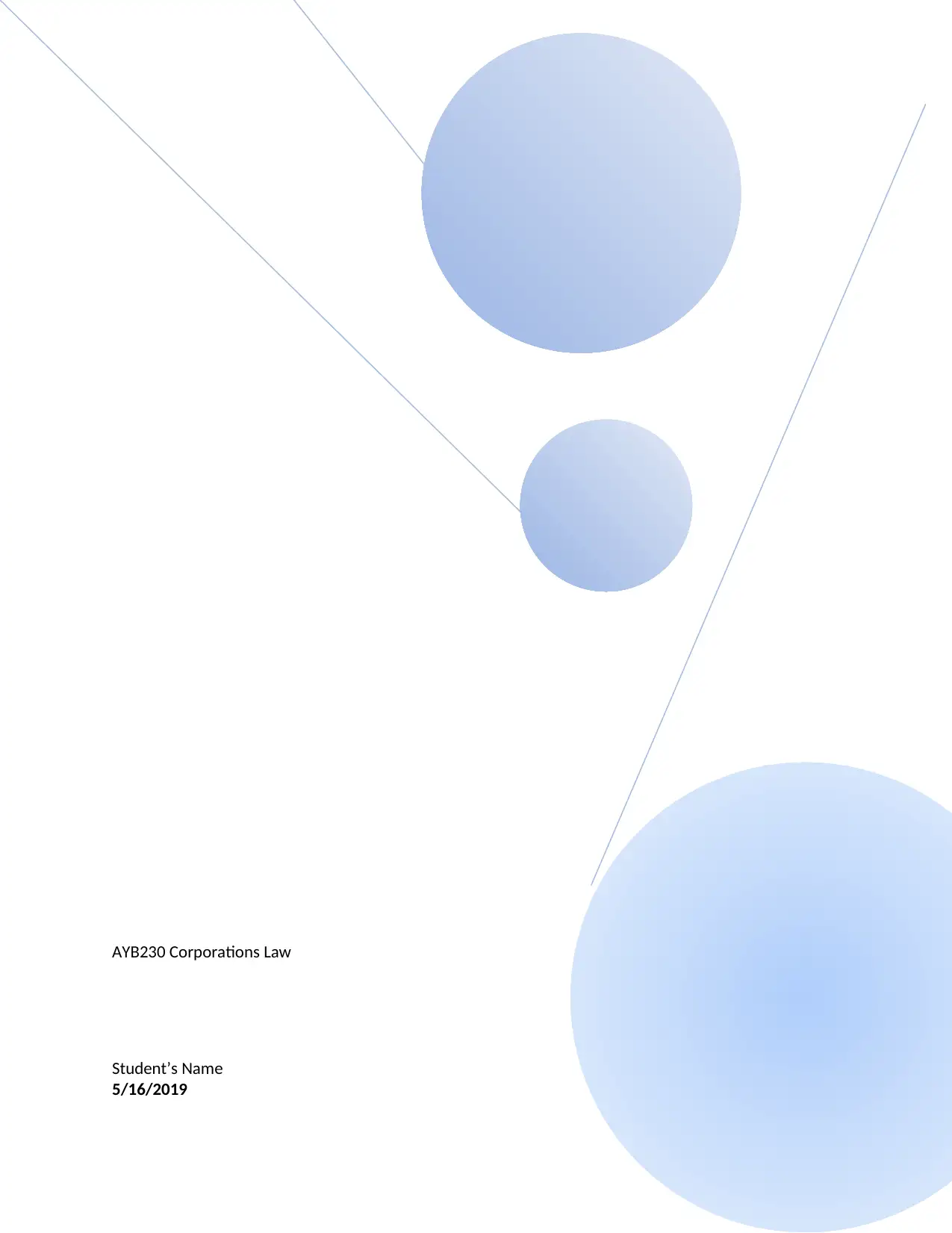
AYB230 Corporations Law
Student’s Name
5/16/2019
Student’s Name
5/16/2019
Paraphrase This Document
Need a fresh take? Get an instant paraphrase of this document with our AI Paraphraser
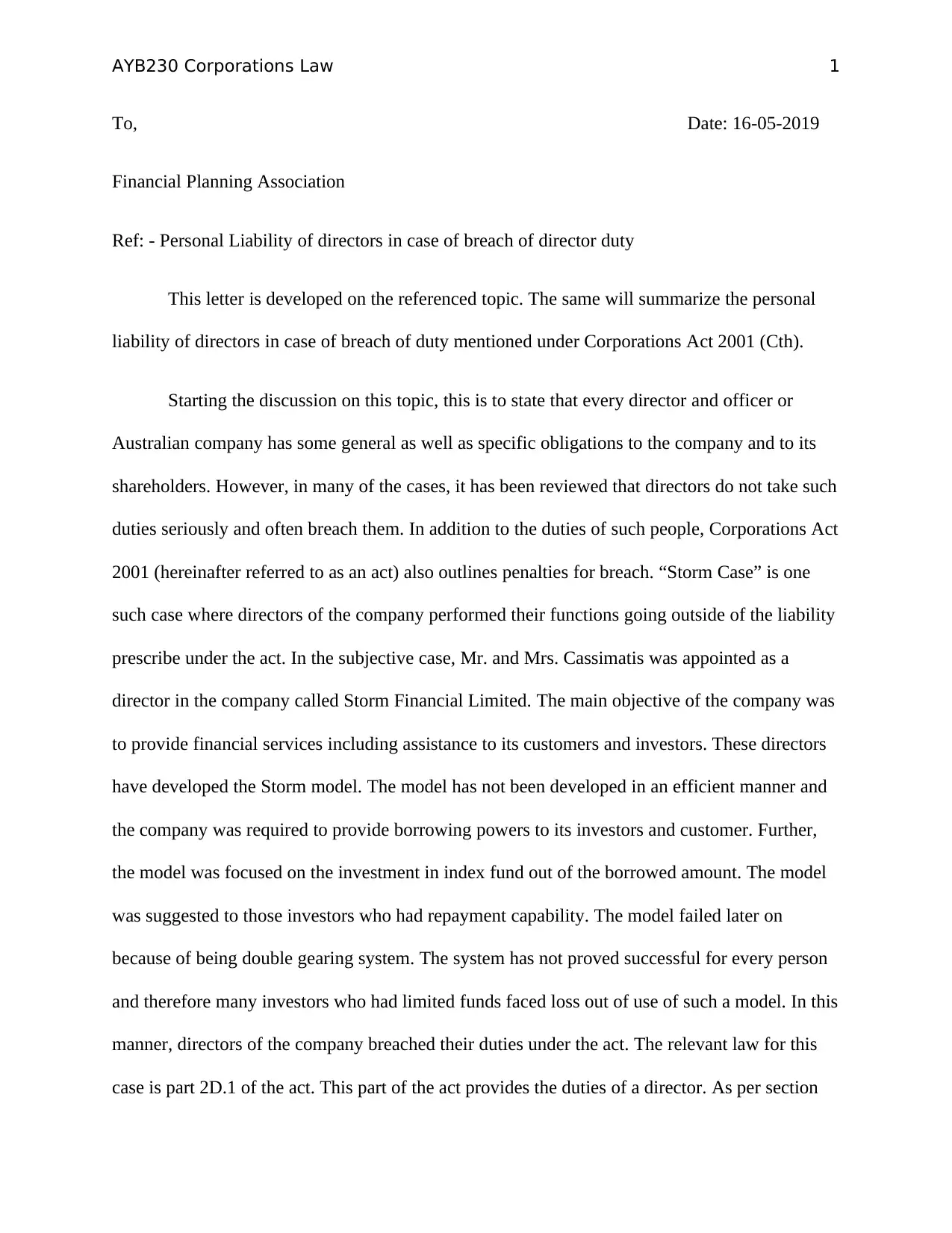
AYB230 Corporations Law 1
To, Date: 16-05-2019
Financial Planning Association
Ref: - Personal Liability of directors in case of breach of director duty
This letter is developed on the referenced topic. The same will summarize the personal
liability of directors in case of breach of duty mentioned under Corporations Act 2001 (Cth).
Starting the discussion on this topic, this is to state that every director and officer or
Australian company has some general as well as specific obligations to the company and to its
shareholders. However, in many of the cases, it has been reviewed that directors do not take such
duties seriously and often breach them. In addition to the duties of such people, Corporations Act
2001 (hereinafter referred to as an act) also outlines penalties for breach. “Storm Case” is one
such case where directors of the company performed their functions going outside of the liability
prescribe under the act. In the subjective case, Mr. and Mrs. Cassimatis was appointed as a
director in the company called Storm Financial Limited. The main objective of the company was
to provide financial services including assistance to its customers and investors. These directors
have developed the Storm model. The model has not been developed in an efficient manner and
the company was required to provide borrowing powers to its investors and customer. Further,
the model was focused on the investment in index fund out of the borrowed amount. The model
was suggested to those investors who had repayment capability. The model failed later on
because of being double gearing system. The system has not proved successful for every person
and therefore many investors who had limited funds faced loss out of use of such a model. In this
manner, directors of the company breached their duties under the act. The relevant law for this
case is part 2D.1 of the act. This part of the act provides the duties of a director. As per section
To, Date: 16-05-2019
Financial Planning Association
Ref: - Personal Liability of directors in case of breach of director duty
This letter is developed on the referenced topic. The same will summarize the personal
liability of directors in case of breach of duty mentioned under Corporations Act 2001 (Cth).
Starting the discussion on this topic, this is to state that every director and officer or
Australian company has some general as well as specific obligations to the company and to its
shareholders. However, in many of the cases, it has been reviewed that directors do not take such
duties seriously and often breach them. In addition to the duties of such people, Corporations Act
2001 (hereinafter referred to as an act) also outlines penalties for breach. “Storm Case” is one
such case where directors of the company performed their functions going outside of the liability
prescribe under the act. In the subjective case, Mr. and Mrs. Cassimatis was appointed as a
director in the company called Storm Financial Limited. The main objective of the company was
to provide financial services including assistance to its customers and investors. These directors
have developed the Storm model. The model has not been developed in an efficient manner and
the company was required to provide borrowing powers to its investors and customer. Further,
the model was focused on the investment in index fund out of the borrowed amount. The model
was suggested to those investors who had repayment capability. The model failed later on
because of being double gearing system. The system has not proved successful for every person
and therefore many investors who had limited funds faced loss out of use of such a model. In this
manner, directors of the company breached their duties under the act. The relevant law for this
case is part 2D.1 of the act. This part of the act provides the duties of a director. As per section
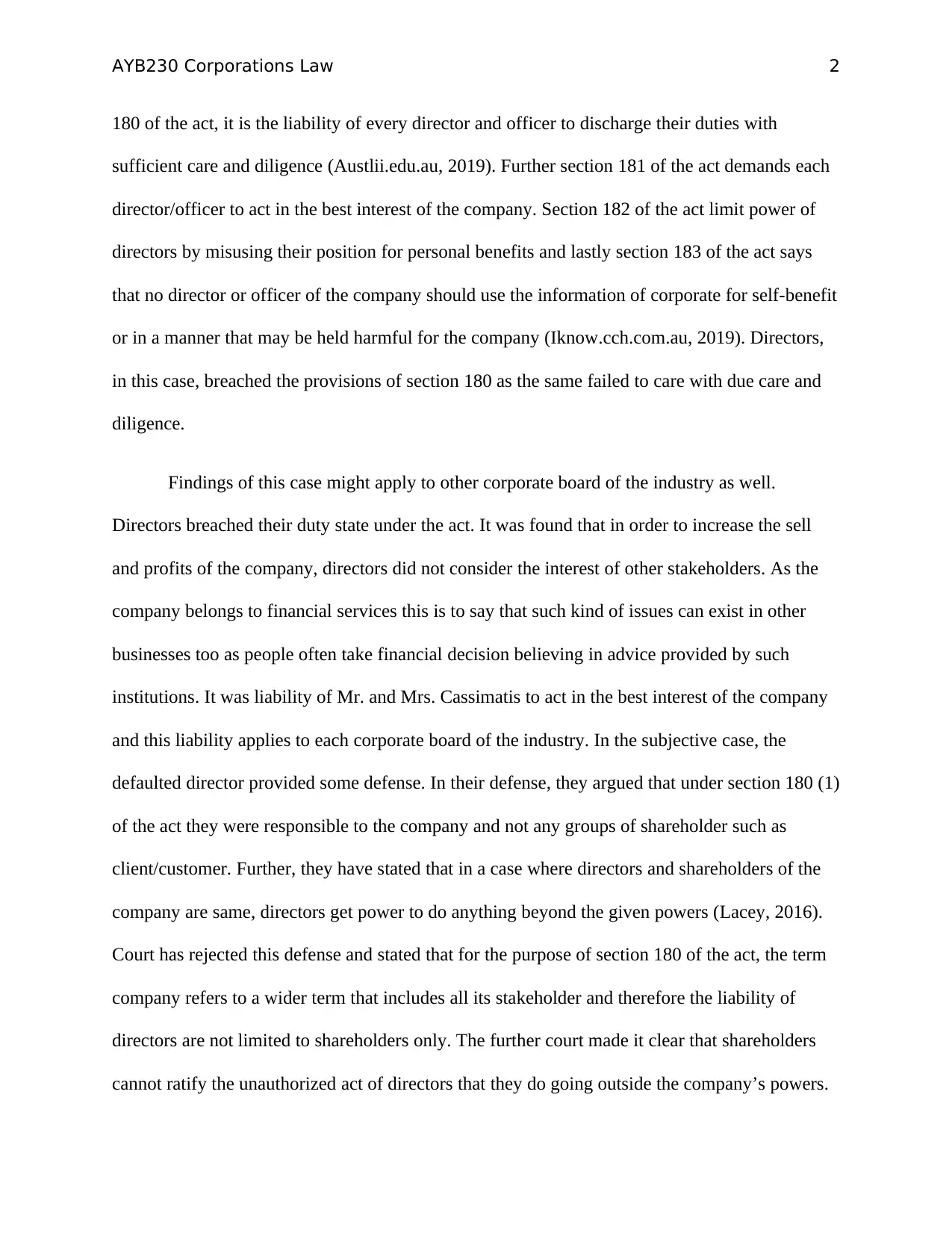
AYB230 Corporations Law 2
180 of the act, it is the liability of every director and officer to discharge their duties with
sufficient care and diligence (Austlii.edu.au, 2019). Further section 181 of the act demands each
director/officer to act in the best interest of the company. Section 182 of the act limit power of
directors by misusing their position for personal benefits and lastly section 183 of the act says
that no director or officer of the company should use the information of corporate for self-benefit
or in a manner that may be held harmful for the company (Iknow.cch.com.au, 2019). Directors,
in this case, breached the provisions of section 180 as the same failed to care with due care and
diligence.
Findings of this case might apply to other corporate board of the industry as well.
Directors breached their duty state under the act. It was found that in order to increase the sell
and profits of the company, directors did not consider the interest of other stakeholders. As the
company belongs to financial services this is to say that such kind of issues can exist in other
businesses too as people often take financial decision believing in advice provided by such
institutions. It was liability of Mr. and Mrs. Cassimatis to act in the best interest of the company
and this liability applies to each corporate board of the industry. In the subjective case, the
defaulted director provided some defense. In their defense, they argued that under section 180 (1)
of the act they were responsible to the company and not any groups of shareholder such as
client/customer. Further, they have stated that in a case where directors and shareholders of the
company are same, directors get power to do anything beyond the given powers (Lacey, 2016).
Court has rejected this defense and stated that for the purpose of section 180 of the act, the term
company refers to a wider term that includes all its stakeholder and therefore the liability of
directors are not limited to shareholders only. The further court made it clear that shareholders
cannot ratify the unauthorized act of directors that they do going outside the company’s powers.
180 of the act, it is the liability of every director and officer to discharge their duties with
sufficient care and diligence (Austlii.edu.au, 2019). Further section 181 of the act demands each
director/officer to act in the best interest of the company. Section 182 of the act limit power of
directors by misusing their position for personal benefits and lastly section 183 of the act says
that no director or officer of the company should use the information of corporate for self-benefit
or in a manner that may be held harmful for the company (Iknow.cch.com.au, 2019). Directors,
in this case, breached the provisions of section 180 as the same failed to care with due care and
diligence.
Findings of this case might apply to other corporate board of the industry as well.
Directors breached their duty state under the act. It was found that in order to increase the sell
and profits of the company, directors did not consider the interest of other stakeholders. As the
company belongs to financial services this is to say that such kind of issues can exist in other
businesses too as people often take financial decision believing in advice provided by such
institutions. It was liability of Mr. and Mrs. Cassimatis to act in the best interest of the company
and this liability applies to each corporate board of the industry. In the subjective case, the
defaulted director provided some defense. In their defense, they argued that under section 180 (1)
of the act they were responsible to the company and not any groups of shareholder such as
client/customer. Further, they have stated that in a case where directors and shareholders of the
company are same, directors get power to do anything beyond the given powers (Lacey, 2016).
Court has rejected this defense and stated that for the purpose of section 180 of the act, the term
company refers to a wider term that includes all its stakeholder and therefore the liability of
directors are not limited to shareholders only. The further court made it clear that shareholders
cannot ratify the unauthorized act of directors that they do going outside the company’s powers.
⊘ This is a preview!⊘
Do you want full access?
Subscribe today to unlock all pages.

Trusted by 1+ million students worldwide
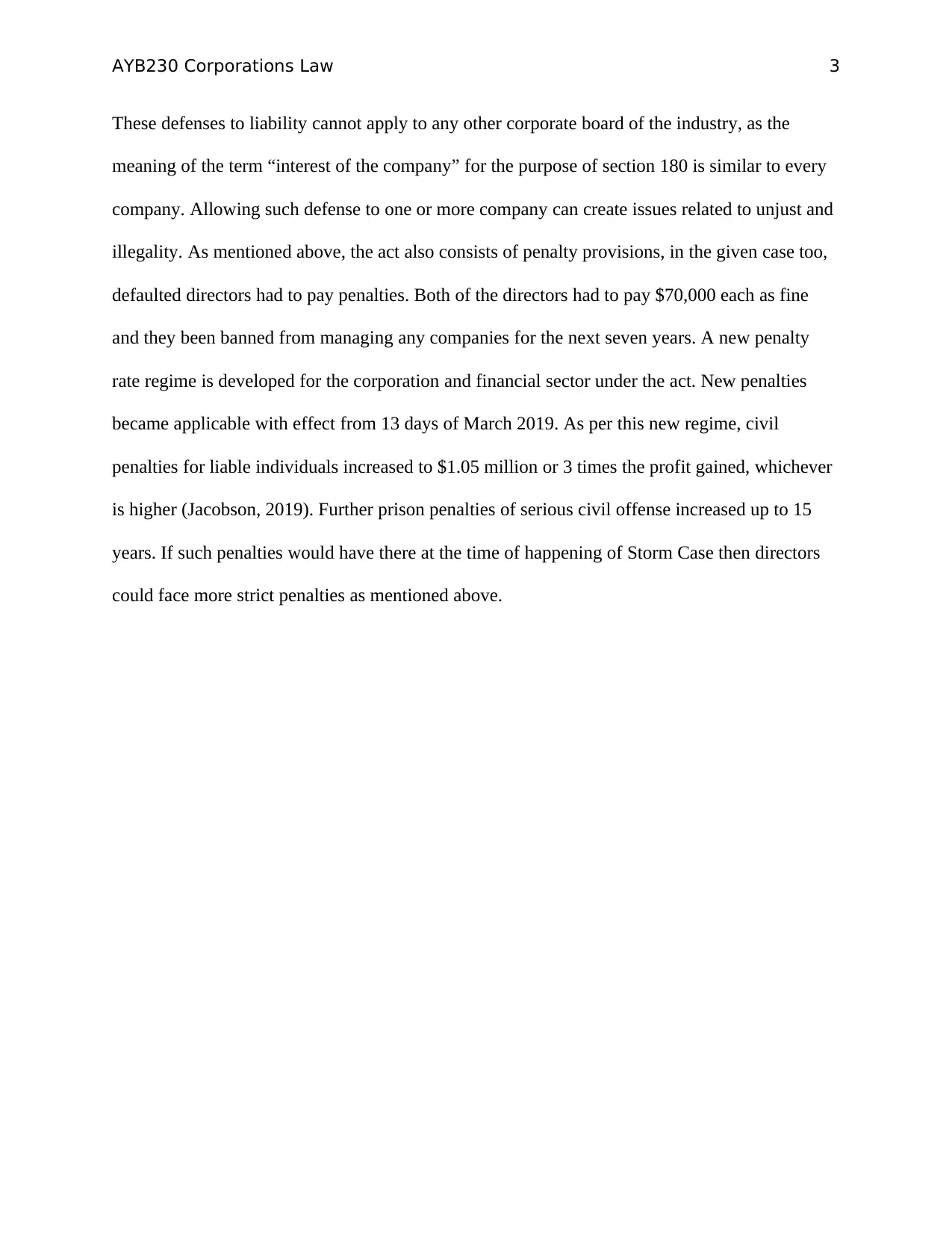
AYB230 Corporations Law 3
These defenses to liability cannot apply to any other corporate board of the industry, as the
meaning of the term “interest of the company” for the purpose of section 180 is similar to every
company. Allowing such defense to one or more company can create issues related to unjust and
illegality. As mentioned above, the act also consists of penalty provisions, in the given case too,
defaulted directors had to pay penalties. Both of the directors had to pay $70,000 each as fine
and they been banned from managing any companies for the next seven years. A new penalty
rate regime is developed for the corporation and financial sector under the act. New penalties
became applicable with effect from 13 days of March 2019. As per this new regime, civil
penalties for liable individuals increased to $1.05 million or 3 times the profit gained, whichever
is higher (Jacobson, 2019). Further prison penalties of serious civil offense increased up to 15
years. If such penalties would have there at the time of happening of Storm Case then directors
could face more strict penalties as mentioned above.
These defenses to liability cannot apply to any other corporate board of the industry, as the
meaning of the term “interest of the company” for the purpose of section 180 is similar to every
company. Allowing such defense to one or more company can create issues related to unjust and
illegality. As mentioned above, the act also consists of penalty provisions, in the given case too,
defaulted directors had to pay penalties. Both of the directors had to pay $70,000 each as fine
and they been banned from managing any companies for the next seven years. A new penalty
rate regime is developed for the corporation and financial sector under the act. New penalties
became applicable with effect from 13 days of March 2019. As per this new regime, civil
penalties for liable individuals increased to $1.05 million or 3 times the profit gained, whichever
is higher (Jacobson, 2019). Further prison penalties of serious civil offense increased up to 15
years. If such penalties would have there at the time of happening of Storm Case then directors
could face more strict penalties as mentioned above.
Paraphrase This Document
Need a fresh take? Get an instant paraphrase of this document with our AI Paraphraser
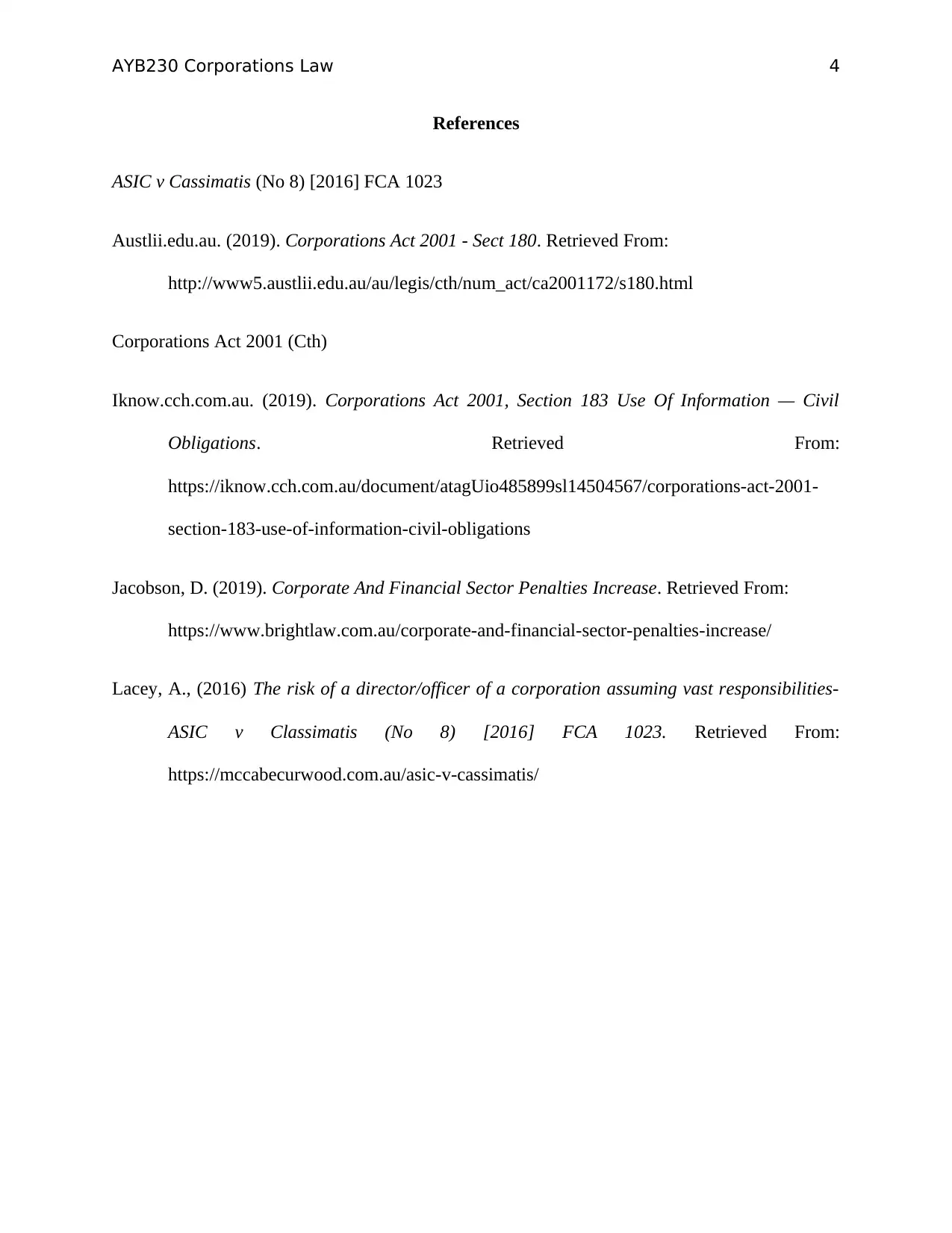
AYB230 Corporations Law 4
References
ASIC v Cassimatis (No 8) [2016] FCA 1023
Austlii.edu.au. (2019). Corporations Act 2001 - Sect 180. Retrieved From:
http://www5.austlii.edu.au/au/legis/cth/num_act/ca2001172/s180.html
Corporations Act 2001 (Cth)
Iknow.cch.com.au. (2019). Corporations Act 2001, Section 183 Use Of Information — Civil
Obligations. Retrieved From:
https://iknow.cch.com.au/document/atagUio485899sl14504567/corporations-act-2001-
section-183-use-of-information-civil-obligations
Jacobson, D. (2019). Corporate And Financial Sector Penalties Increase. Retrieved From:
https://www.brightlaw.com.au/corporate-and-financial-sector-penalties-increase/
Lacey, A., (2016) The risk of a director/officer of a corporation assuming vast responsibilities-
ASIC v Classimatis (No 8) [2016] FCA 1023. Retrieved From:
https://mccabecurwood.com.au/asic-v-cassimatis/
References
ASIC v Cassimatis (No 8) [2016] FCA 1023
Austlii.edu.au. (2019). Corporations Act 2001 - Sect 180. Retrieved From:
http://www5.austlii.edu.au/au/legis/cth/num_act/ca2001172/s180.html
Corporations Act 2001 (Cth)
Iknow.cch.com.au. (2019). Corporations Act 2001, Section 183 Use Of Information — Civil
Obligations. Retrieved From:
https://iknow.cch.com.au/document/atagUio485899sl14504567/corporations-act-2001-
section-183-use-of-information-civil-obligations
Jacobson, D. (2019). Corporate And Financial Sector Penalties Increase. Retrieved From:
https://www.brightlaw.com.au/corporate-and-financial-sector-penalties-increase/
Lacey, A., (2016) The risk of a director/officer of a corporation assuming vast responsibilities-
ASIC v Classimatis (No 8) [2016] FCA 1023. Retrieved From:
https://mccabecurwood.com.au/asic-v-cassimatis/
1 out of 5
Related Documents
Your All-in-One AI-Powered Toolkit for Academic Success.
+13062052269
info@desklib.com
Available 24*7 on WhatsApp / Email
![[object Object]](/_next/static/media/star-bottom.7253800d.svg)
Unlock your academic potential
Copyright © 2020–2026 A2Z Services. All Rights Reserved. Developed and managed by ZUCOL.

![HA3021 Corporations Law: Case Study on ASIC v Cassimatis [2016]](/_next/image/?url=https%3A%2F%2Fdesklib.com%2Fmedia%2Fasic-cassimatis-breach-director-duty_page_2.jpg&w=256&q=75)



